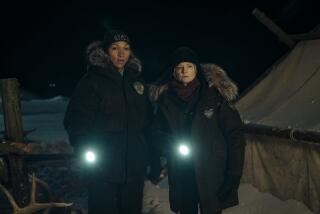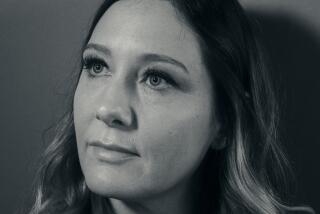Jacki Weaver is baking a cake for you
- Share via
A longtime stage veteran (clocking about 100 plays), Jacki Weaver hasn’t made nearly as many films in her 48-year career — 15, she thinks — but they’ve been ones that counted. She was in Peter Weir’s “Picnic at Hanging Rock,” and her awards include Australian Film Institute honors for “Caddie” (1976) and “Stork” (1971), as well as a Logie (the Australian Emmy) for the 1976 TV movie “Do I Have to Kill My Child?” The latter title could well represent a question her character in this year’s “Animal Kingdom” might answer with, “I suppose,” without ever looking up from mixing cake batter. Among the laurels the 63-year-old actress already has collected for her role in that film as Janine “Smurf” Cody, the sweet but sociopathic matriarch of a small-time crime family in Melbourne: wins from the Australian Film Institute, National Board of Review and Los Angeles Film Critics Assn., with nominations from many others, including the Golden Globes. She spoke about the film by phone from Sydney, where she’s, you guessed it, doing a play.
Are you surprised by the response to “Animal Kingdom”?
It’s been very exciting and very unexpected at this point in my career. It began with all the fuss that was made in Sundance; from there it just snowballed. David [Michôd]’s an exceptional filmmaker. We shot a lot of really good scenes that he cut out because they didn’t drive the action enough. It’s like Hemingway said, “You get a good book when you throw out your favorite bits.” [Laughs] It’s grown-up filmmaking — there are a lot of contradictions, which is what real life is like. Nothing is explained; the loose ends aren’t tied up. I think good filmmaking and good playmaking is when you make the audience work.
You researched female criminals — can you point to specific things that informed your performance?
I’ve got to be careful here because I could be sued for defamation. A lot of the things I drew on were based on real people who are still living in Melbourne. There were quite a few case histories. David wanted to make a fiction film so he’d have more room for interpretation, but the events are very close to some things that actually happened in Melbourne. I love the way too that “Animal Kingdom” doesn’t glamorize the criminal world at all — I love glamorous-criminal movies as much as anyone, but this one’s quite sordid and squalid. I think it does show these are ordinary, kind of sad people, really. I mean, who’d want to be a criminal if you have to live a life like the Codys?
Was there a detail or two you were happy to get in there?
Because David’s an auteur and he lives with a script for 10 years, sometimes as a caprice, he’ll say, “I’ll change that.” A couple of those things were just little tiny details, like when she’s talking to the neighbor and she’s stirring the cake mix. He said, “I don’t know about that. I’ve changed my mind about the cake mix.” I said, “Remember why you wrote that in the first place — it’s an ordinary thing to do. It’s the banality of evil.” It’s a normal thing, yet another frightening contradiction about this woman. She’s a murderess. She might not be pulling the trigger herself, but she’s an evil person. To show her making a cake and talking about a TV show is a splendid contradiction.
I don’t know if you have this feeling as an Australian, but it seems there’s been a resurgence in Australian films getting noticed in America — especially crime films.
Well, from what I hear, that certainly seems to be going on. But I’ve been around long enough to have seen a resurgence in the Australian film industry a few times. The young bunch of filmmakers we’ve got at the moment are very talented — especially David Michôd. If I’m thrilled about the reaction to me in “Animal Kingdom,” I’m honestly more thrilled about the reaction to David because he’s such a talent. He’s a natural-born storyteller. He’s an auteur, he’s a visionary. And he’s also a collaborator. I think you always get the best results when it’s more collaborative. So there’s some great talent around, and they’re all young and fresh and supportive of each other — that’s the other thing: It’s a real film community going on in Australia. Young chaps who rally ‘round and help their mates get their films done; it’s great.
More to Read
Only good movies
Get the Indie Focus newsletter, Mark Olsen's weekly guide to the world of cinema.
You may occasionally receive promotional content from the Los Angeles Times.








